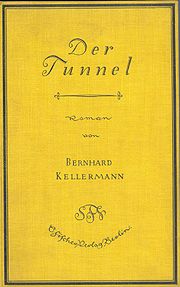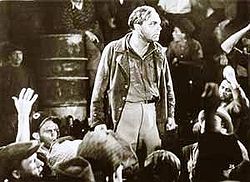.gif)
Der Tunnel (novel)
Encyclopedia

Bernhard Kellermann
Bernhard Kellermann was a well known German author and poet.- Life :Bernhard Kellermann enrolled in 1899 at Munich's Technical University initially in general studies, but later focused on German literature and painting....
published in April 1913. The novel sold 100,000 copies in the six months after its publication, and it became one of the most successful books of the first half of the 20th Century. By 1939 its circulation had reached millions. The main theme of the novel is social progress, particularly with respect to modern technology.
Plot
Allan, an idealistic engineer, wants to build a tunnel at the bottom of the Atlantic OceanTransatlantic tunnel
A transatlantic tunnel is a theoretical tunnel which would span the Atlantic Ocean between North America and Europe and would carry mass transit of some type—trains are envisioned in most proposals.Using advanced technologies, speeds of are envisaged....
connecting America with Europe
Europe
Europe is, by convention, one of the world's seven continents. Comprising the westernmost peninsula of Eurasia, Europe is generally 'divided' from Asia to its east by the watershed divides of the Ural and Caucasus Mountains, the Ural River, the Caspian and Black Seas, and the waterways connecting...
within the space of a few years. The idealist's scheme is thwarted for financial reasons, and the tunnel construction (in particular a segment dug under a mountain) experiences several disasters. A fiasco seems inevitable, the army of workers revolt, and Allan becomes a figure of universal hatred throughout the world. After 26 years of construction, the tunnel is finally completed; however, the engineering masterpiece is outdated as soon as it opens, as aeroplanes now cross the Atlantic in a few hours.
Reception
The reception of the book and its sentiments was extremely positive, and was on its publication a success for Kellerman. The story anticipated important social events as the Great DepressionGreat Depression
The Great Depression was a severe worldwide economic depression in the decade preceding World War II. The timing of the Great Depression varied across nations, but in most countries it started in about 1929 and lasted until the late 1930s or early 1940s...
, and had the charm of a parallel world history of a 1920s and 1930s in which the First World War never occurred. It also made the critical observation that technology always becomes outdated with its application.
Controversy
A controversial aspect of the book was its thinly-veiled racistRacism
Racism is the belief that inherent different traits in human racial groups justify discrimination. In the modern English language, the term "racism" is used predominantly as a pejorative epithet. It is applied especially to the practice or advocacy of racial discrimination of a pernicious nature...
overtones in the character of S. Woolf, Allan's nemesis. Woolf is a financial magnate who emigrated from Eastern Europe
Eastern Europe
Eastern Europe is the eastern part of Europe. The term has widely disparate geopolitical, geographical, cultural and socioeconomic readings, which makes it highly context-dependent and even volatile, and there are "almost as many definitions of Eastern Europe as there are scholars of the region"...
, and was portrayed as immoral and perverted. These stereotypes were common at the time Kellerman wrote.
Film adaptations

Silent film
A silent film is a film with no synchronized recorded sound, especially with no spoken dialogue. In silent films for entertainment the dialogue is transmitted through muted gestures, pantomime and title cards...
, directed by William Wauer. Its most famous incarnations on the silver screen are the three films released in 1933 and 1935, one version each in German (Der Tunnel), French (Le Tunnel) and English (The Tunnel
The Tunnel (1935 film)
The Tunnel, also known as Transatlantic Tunnel in the United States, is a 1935 British science fiction film based on the 1913 novel Der Tunnel by Bernhard Kellermann, about the building of a transatlantic tunnel. It was directed by Maurice Elvey and stars Richard Dix, Leslie Banks, Madge Evans,...
also known as Transatlantic Tunnel). The French and German versions were directed by Curtis Bernhardt
Curtis Bernhardt
Curtis Bernhardt was a German film director born in Worms, Germany, under the name Kurt Bernhardt. Some of his American films were called "woman's films" including the Joan Crawford film Possessed . Bernhardt trained as an actor in Germany, and performed on the stage, before starting as a film...
and the English by Maurice Elvey
Maurice Elvey
Maurice Elvey was the most prolific film director in British history. He directed nearly 200 films between 1913 and 1957. During the silent film era he directed as many as twenty films per year....
. At the time it was not unusual to release a film in separate versions in different languages, each using different actors or directors.

